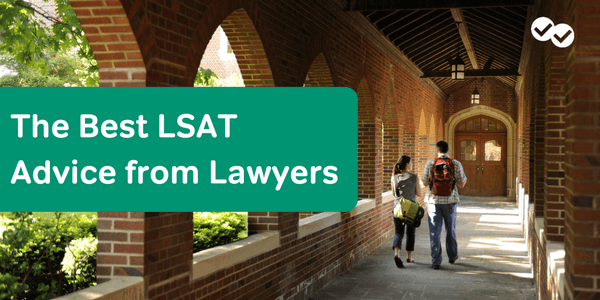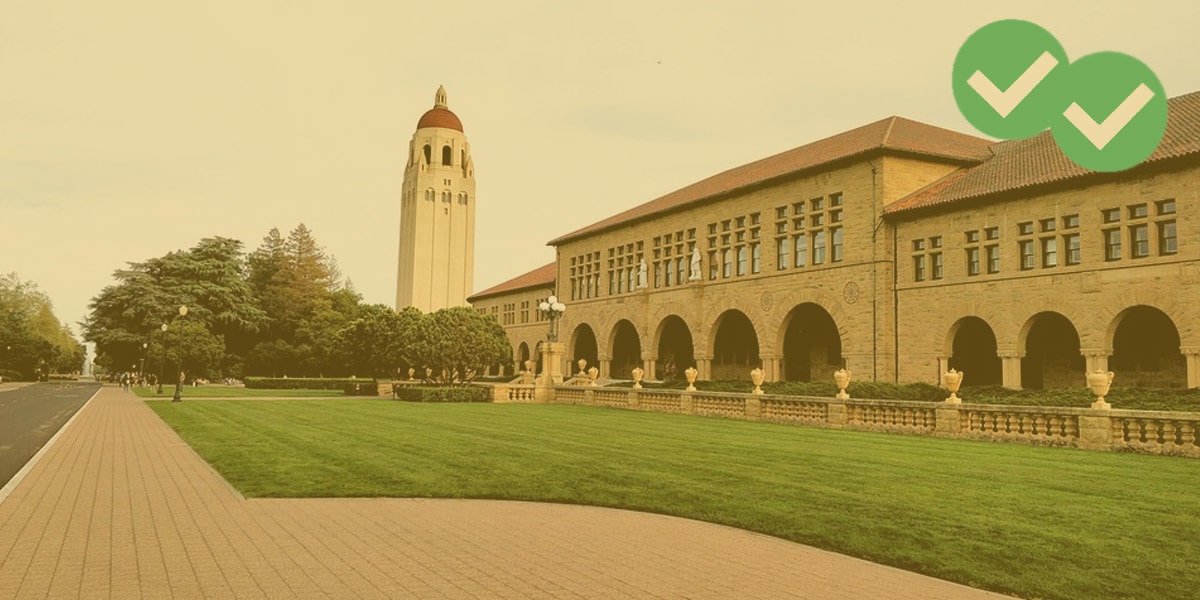Earning a high score on the Law School Admission Test (more commonly referred to as the LSAT) is arguably the most important step you can take to ensure admission into a top law school. To help you make the most of your LSAT prep, I went in search of the best LSAT advice from lawyers.
What did I learn? Well, getting a top LSAT score is easier said than done. The LSAT tests your ability to perform well in law school, and therefore is different from the other standardized tests that you’ve taken up to this point. While some of your college coursework may come in handy when it comes to general logic, reasoning, and analytical skills, the LSAT does not assess your coursework up to this point. Getting the LSAT score you need for a top law school will require significant LSAT-specific preparation.

LSAT Advice from Lawyers Who Know the Test
When approaching your LSAT prep, there’s no need to go it alone. Many have gone before you. They’ve tried different strategies, made mistakes, and ultimately gotten the LSAT scores they needed to get into law school.
So, to help provide you with some guidance, I reached out to LSAT (and Bar Exam!) survivors and asked the following questions:
- What is the best LSAT prep advice you can offer?
- What are your top tips for raising your LSAT score?
- What is one thing you wish you’d done differently during your own LSAT prep?
The advice I received was as varied as the lawyers themselves. But some themes were clear: study early, take practice tests, and don’t go it alone. Read on for the best LSAT advice successful lawyers have to offer.
(To learn more about the wonderful people who offered their advice, click the name under their quote or visit the end of the post.)
Know the LSAT Inside and Out
Don’t wing it
Many people believe that good grades and college success will translate directly into a high LSAT score. Not true. Just because you were a college basketball star doesn’t mean you can hop on the tennis court and play like Roger Federer; different sports require different skills. The LSAT is no different. Like an athlete, LSAT takers need to familiarize themselves with the test’s landscape. What are commonly asked questions? What are the pitfalls? How do you manage pacing? Understanding the nature of the LSAT and potential landmines will take you a long way toward a better score. The worst thing you can do is flip through an LSAT book and show up. Like anything in life, preparation is the foundation for success.
Learn strategies
The best advice I can offer for LSAT prep is… learn strategies for the various parts of the test and use those strategies when studying.
Take a Prep Course
Stick to the schedule
My advice is that you absolutely have to do a prep course! Trust their schedule and do everything that is required. I would recommend not to get too down on yourself if you start low and don’t get the scores you thought you would be getting. Believe that if you put the work in, you will get the results. I am not sure I would change anything I did. I actually kind of enjoyed it!
Ask for guidance
Don’t go it alone. If you wanted to be a good golfer, would you read a book on it? Of course not. You would probably enlist the help of a friend or coach who knows how to play golf well. The LSAT works the same way. If you can get input, guidance and assistance from people who’ve had success, then you will be in a better position to have success yourself. Invariably, there may be a concept or technique that just doesn’t register the first time through; having someone who can help you get over the “hump” if and when those issues arise can be invaluable.
Know that it’s worth the cost
The number one piece of advise I give to people considering law school is taking a prep course and actually following their plan. I never took a prep class primarily because I wasn’t able to afford it but I know people who increased their score dramatically. However, in hindsight I probably could have afforded the costs had I known that they would have been so beneficial.
Go all in
My honest advise is to create a self imposed bubble and move inside of it. Cut yourself off from the rest of the world and devote yourself to the prep course and practice tests. Do not get to comfortable in the real world as once the LSAT is done as you will have to reenter the bubble both for 1L exams and the bar exam.
Create a Study Plan and Stick To It
Study regularly
Set a schedule. Don’t cram. It’s a recipe for performing below your best. It’s critical that you give yourself enough time to prepare for the test and that you allocate time for preparation on a regular basis. There will undoubtedly be some areas that may take a bit more time for you to grasp, so leave yourself time to work through those areas before test day.
Start studying early
I honestly wish I would have started studying earlier. I didn’t know I wanted to go to law school until a few months before applications were due so I was running around trying to study as much as I could. If I could go back in time, I would’ve taken a practice test a whole year before so that I could identify where I needed improvement, with enough time to make those improvements. LSATs are all about brain power and stamina, so if I’d had more time, I think I would have done better. This is what I did for the Bar Exam, and I think that the same tips can be applied to the LSAT. The earlier you start studying, the more time you have to figure out where you can improve.
Take Timed Practice Tests
Review all your answers
The best advice I would give someone is to take as many practice tests as you can. You can review all the prep materials you want, but nothing will prepare you like a simulated test. Make sure to time yourself and review all your answers, both the correct and incorrect ones. And for the logic games, try to identify the hardest game at the outset and save that for last. Better to focus on the “easier” games first.
Improve your stamina
The LSAT is a big deal! Many times college students think of the LSAT as the ACT or SAT and they believe it is not a test they need to study for, or study as much for. This is the wrong approach. Be sure to take plenty of practice tests to get a feel for what the test is actually going to be like. The actual test itself is long, so by taking multiple practice tests it will help not only with learning the content, but with time control.
Be realistic about your practice scores
NEVER put 100% trust in your practice test scores. 99.9% of the time, they are NOT representative of your final score. Use them as guide posts to provide direction on which areas to work on. As an admissions professional, we don’t put much stock in your practice scores.
Understand Your Strengths and Weaknesses
Stop losing easy points
I took a few practice tests before diving into my “real” studying, to determine where I was lacking. It turns out that the logic games section was my strongest point but reading comprehension I was losing a lot of silly points… I think figuring out what your weak point [is] huge. I took the LSAT twice and the second time my score shot up in one of the sections because that was all I focused on before taking the LSAT a second time.
Best LSAT Advice: Final Thoughts
Take the LSAT twice
I personally took the LSAT twice and did significantly better the second time. I attribute that to the fact that when I studied for my first attempt, I simply read the books and did practice questions. I had no specific strategies for certain types of questions and my progress remained stagnant. However, the second time I worked with a tutor briefly and learned several strategies, which helped immensely. Changing how I studied the second time and having been familiar with the mental stamina required enabled me to be accepted to multiple schools.
Also, contrary to what people may say, there is absolutely nothing wrong with taking the LSAT twice, assuming the registration fee isn’t a hurdle. In fact, most law schools will take your highest score into consideration rather than an average of the two, so there is no punishment for taking it multiple times.
Keep things in perspective
Attending a less prestigious law school is not the end of the world. When I used to be a prosecutor I knew several successful prosecutors, judges, and private attorneys that attended law schools that were not fully accredited or ones that had just become accredited. Really, what matters are the connections you make in law school, how good your grades are, and the extra curricular activities that you participate in during law school that affect your first job out of law school. After that it is the reputation that you earn as a lawyer that will make or break your legal career not the law school you attended.
Take a logic course
The college course I found most valuable/applicable to the LSAT: Symbolic Logic.
This is after having a really solid background in mathematics—especially algebra—and a solid background in philosophy—specifically, basic logic. Put the two together, and you have the LSAT. Truly, it tests an applicant’s ability to analyze syllogistic reasoning, and Symbolic Logic trains people to illustrate that reasoning on paper like an algebra problem. When you apply that to the LSAT, you waste very little time.
Get sleep before the test
As for what I’d do differently, rent a hotel in a quiet area but near the test site. I made the mistake of sleeping at home and my neighbors decided to throw a huge party the night before. I ended up sleeping on the floor in my closet because the noise was so loud.
There you have it! The best LSAT advice from successful lawyers. If you have any further questions, comments, or advice you’d like to share, please leave a comment at the bottom of this post. We’d love to hear from you and keep the conversation going!
Meet Your Advisors
I’d like to offer my gratitude to the wonderful people who offered their advice and experience to help our Magoosh LSAT community. I’d encourage Magooshers reading this post to click the links below to learn more about your LSAT prep advisors.
Cody C. Branham
Attorney at Morris, Laing, Evans, Brock & Kennedy, Chtd.
Attended University of Kansas School of Law
Tony Cardenas
Dean of Admissions at Florida Coastal School of Law
James Goodnow
Attorney at Fennemore Craig P.C.
Attended Harvard Law School
Omar Jaleel
Attorney at Jaleel Law P.C.
Aaron Lukken
Attorney at Viking Advocates, LLC
Attended University of Missouri-Kansas City School of Law
John Mennie
Attorney at Salvi, Schostok & Pritchard P.C.
Attended Western Michigan University’s Thomas M. Cooley Law School
Nikole Messerschmidt
Attorney at Salvi, Schostok & Pritchard P.C.
Attended Valparaiso University School of Law
Yesenia Perez
In-House Compliance Counsel at Innovative Benefit Planning, LLC
Attended DePaul University College of Law in Chicago
David Rosenfield
Law and English Lecturer at Assumption University and Of Counsel at Gordon & Rees
Todd A. Spodek
Attorney at Spodek Law Group P.C.
Attended Pace University School of Law





